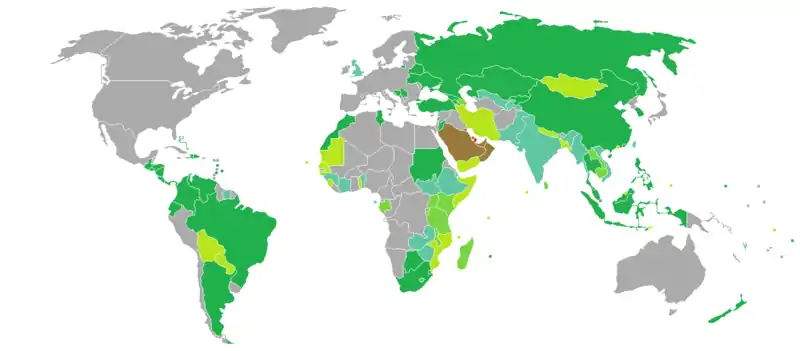Qatari nationality law
Qatari nationality law is based mostly on jus sanguinis. Qatari citizens enjoy freedom of movement between other GCC, member states, similar to the European Union or the Trans-Tasman agreement between Australia and New Zealand.
| Qatari Citizenship Act | |
|---|---|
 | |
| Parliament of Qatar | |
| |
| Enacted by | Government of Qatar |
| Passed | un |
| Status: Current legislation | |
By residence
- Persons who maintain a lawful and regular residence from 1930-2019 are taken to be nationals of Qatar.
By descent
- Any person who can demonstrate Qatari descent may apply to be a citizen of Qatar, depending on certain conditions.
- Any person born to a Qatari father irrespective of their place of birth are Qatari citizens by descent.[2]
By naturalization
Foreigners may be granted citizenship if they fulfill the following:[3] by decree of the Emir, providing the following conditions
- Legal continuous residence in Qatar for a period of 25 years, with less than 2 months absence allowance made per a calendar year.
- Lawful income and means of subsistence
- Good repute and character, and no convictions relating to integrity or honour of the individual.
- Functional knowledge of the Arabic language
Even though Qatari law allows naturalization of foreigners, Qatar rarely grants them citizenship even if they have a Qatari mother.[4]
Recently, Qatar has offered a quick citizenship process for citizens of GCC member state, Bahrain.[5]
In September, Qatar announced to grant residency to foreign investors investing an unspecified level of "non-Qatari capital" in the economy of the country. Foreign investors, including property developers active in Qatar’s real estate market, will be eligible for a renewable five-year residency permit under the new law.[6]
Dual citizenship
Qatar does not recognize dual citizenship. Holding another citizenship may lead to the revoking of Qatari citizenship.[7]
Loss of Qatari citizenship
The person may lose Qatari citizenship in the following cases:
- the person joins the military service of a foreign country.
- the person works for a foreign government that is in war with Qatar.
- the person takes up a foreign nationality.
Citizens are allowed to voluntarily give up Qatari citizenship.[1]
Travel freedom

In 2016, Qatari citizens had visa-free or visa on arrival access to 79 countries and territories, ranking the Qatari passport 60th in the world according to the Visa Restrictions Index. Qatari citizens are currently not allowed to enter the GCC member states of Saudi Arabia, the UAE and Bahrain. Prior to 2017, they were allowed in all GCC countries. [8]
References
- "Qatari citizenship". Archived from the original on 21 February 2015. Retrieved 21 February 2015.
- "Law No. 38 of 2005 on the acquisition of Qatari nationality". Al Meezan. Retrieved 21 February 2015.
- "Qatar's citizenship law to benefit Indians". Times of India. Retrieved 21 February 2015.
- "How to get a Qatari citizenship? Not even if your mother were a Qatari, but play a sport and you stand a chance". Just Here. nofe al-suwaidi. Archived from the original on 30 October 2017. Retrieved 21 February 2015.
- Bahrain accuses Qatar of luring citizens to switch nationality-agency | Reuters. In.reuters.com (7 August 2014). Retrieved on 2017-04-18.
- "Qatar announces new residency scheme for investors". Retrieved 16 September 2019.
- "Dual citizenship 'is not allowed under Qatari law'". Gulf news.com. Retrieved 21 February 2015.
- http://www.aljazeera.com/news/2017/06/qatar-diplomatic-crisis-latest-updates-170605105550769.html